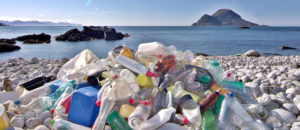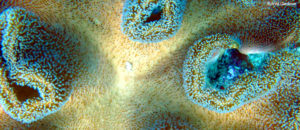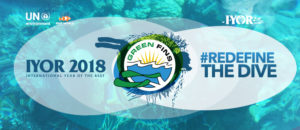For those of us connected with the ocean through work or leisure, each year is a rollercoaster of emotions when it comes to the news. The climate is getting warmer and bleaching events are lasting years — plural. The seas are getting more acidic; environmental protection laws face repeal; and the colossal volume of plastic infecting every part of our ocean continues to grow. Issues at a global scale and the glacial pace of action at the government level can lure you into that dark place. What’s the point if nothing is changing? Will this ecosystem be dead in 50 years no matter what I do? Why bother? The International Coral Reef Initiative launched the International Year of the Reef to bring attention to these global threats.

Working together
At the heart of every major change in society is someone who decided to take action, however small, to address something within their control. That’s one of the reasons that the Green Fins initiative exists. Conceived by the UN Environment and internationally coordinated by The Reef-World Foundation, it leverages the passion the diving industry has for the oceans to create positive change. Green Fins helps dive and snorkel operator members find pragmatic solutions to local environmental threats. One by one, each member makes solid changes to their business practices to protect reefs and collectively this helps us effect global change.
But why work with divers and snorkelers in the face of bigger, more intense global threats? It’s not about pointing fingers or shifting the blame. Any human interaction with the sea has an impact. It’s about leading by example. Remember, one of the best things we can do to protect the reef is to address what we can control.
Do your part
A study by Medio and colleagues in 1997 found that divers came in contact with the reef an average of 5.79 times per dive. Imagine each dive site has two moorings, and there are two boats for each mooring during a day. If each boat carries 12 divers doing two dives per day, that dive site could experience 556 diver impacts a day or 202,882 a year. An errant fin kick here or there makes a small impact, but over the year it adds up to immense damage. As one of the fastest-growing leisure sectors, the dive industry must address the scale of impact and, more importantly, the fact that we can do something about it.
By alleviating local threats, we help coral reefs remain more resilient to those major threats out of our control. The more we learn about coral reefs, the more we realize how adaptable they are. Certain coral species can switch out their zooxanthellae for more heat-resistant strains and avoid bleaching in the first place, and reefs with high biodiversity can recover faster from bleaching if it does occur. In the face of an uncertain future, every reef user has a vital role to play in keeping the reefs as healthy as possible.
Green Fins celebrates the International Year of the Reef 2018

Reef-World is releasing the Green Fins International Year of the Reef 2018 campaign. In doing so, the organization aims to cultivate a positive behavior change within the diving community. Everyone from recreational divers to dive-equipment manufacturers can make a difference. The campaign will cover four simple action areas for the dive industry:
- Redefine the dive: From errant fin kicks to poor photography techniques, this action point delivers new tips and tricks guides can use to “redefine” how their guests dive. Dive tourists will gain a deeper understanding of what to expect from their dive shops and dive guides.
- No anchoring: while the impacts of anchoring are well known, the practice remains pervasive in many locations around the world. The program will clearly outline alternatives.
- No fish feeding: Fish feeding is a highly popular tourism activity around the world, but its impacts remain long after that bag of bread is empty. Tourists will learn the issues surrounding this practice.
- Healthy oceans mean a healthy business: any business related to divers has an inherent interest in healthy coral reefs. Equipment manufacturers have a unique opportunity to lead the way into a circular economy and protect the oceans from a plastic tide. Different stakeholders and individuals will be invited to pledge for coral-reef protection in the long-term.
Redefine the dive

The first campaign action point will be released from February to April 2018 on Green Fins’ social media channels. An average of 70 percent of divers contact the reef while diving. But why this is considered a threat, and why is direct diver damage so relevant to marine conservation? What can you do? This campaign will answer all of these questions and more.
We’ll gather all the relevant information in one “Redefine the Dive” infographic, created especially for the campaign and to be released in April. Here you can get all the tips you need as dive professionals to #RedefineTheDive and learn how to be a zero-impact diver.
Follow the different Green Fins social media platforms to get involved and make a change. Because if you don’t — who will? #Redefinethedive and help #saveourreefs
Facebook | Twitter | Instagram | YouTube | Deepblu
For more information on the International Year of the Reef 2018 follow this link: www.iyor2018.org
Want to be part of the movement? Share. Print. Post. Hashtag
By guest author Samantha Craven, The Reef-World Foundation
The post Green Fins International Year of the Reef Campaign: #RedefineTheDive appeared first on Scuba Diver Life.
from Scuba Diver Life http://ift.tt/2HmLr3B
No comments:
Post a Comment